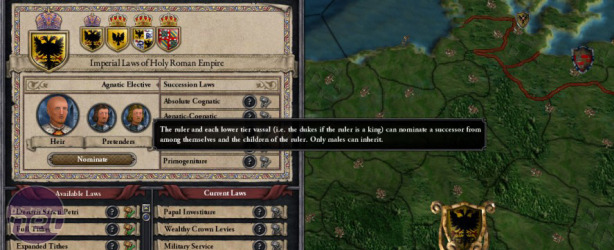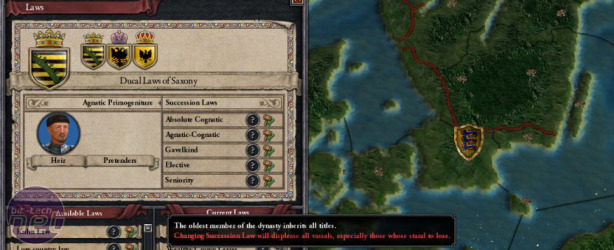
Crusader Kings 2 PC Preview
It’s at this point that the social manipulation features start to emerge. You’ll need to stay in close contact with your children and competitors as they grow, monitoring their popularity, gathering rumours and trying to predict their actions. This information will, in turn, dictate your game plan.There are interesting philosophical arguments embedded into these game systems too, such as the way children in Crusader Kings 2 are defined more by their education than their parents or their genes. Children are usually sent to either the Church or the Military for their education, although they can also be educated at home by their mother if the situation allows for it. It’s not a case that an army education will produce a stone-cold killer, but there is a bias built in.
Crusader Kings 2 also takes the line that people are unable to defy their own upbringing or genetics – they're defined absolutely and unchangingly by their personality. A person with the Greedy trait, for example, will not be able to buy popularity by giving money to the poor, while Pacifists will be unable to go to war. In Crusader Kings 2 your personality is dictated by what you've been taught.
A bad combination of traits can therefore dictate much of how the game unfolds. Popularity is one of the best gauges of success in Crusader Kings 2 and can be accrued in a number of ways; some characters are natural charmers or socialites, while others will have to bribe or threaten their opponents. Some lords, however, may find ingratiating themselves with their peers a particularly troublesome task.
In order to stay true to the events of the period, and to make sure that nobody can game the system by relying on just a single trait or tactic, Paradox has included a few scripted events in Crusader Kings 2’s otherwise uncontrolled world. The Crusades and the attack of the Mongol hordes are the two big events, requiring players to commit valuable resources and family members to both causes.
What interests us the most, however, is the way that religion is threaded through the game. On the strategic side of Crusader Kings 2, players are required to build the cities their family commands in order to gain popularity and prestige – and the quickest way to do that is to build churches to gain the love of the people. However, churches also require bishops to collect taxes, give sermons and popularise the idea that the Crusades are A Good Thing.
The problem with Bishops, however, is that they might not always be on your side and may be loyal to the Pope instead. Papal loyalists are trickier to manage, as they turn all funds over to the Pope eventually, but they also can’t be attacked head-on without risk of excommunication. It's possible to rise against the church and install your own Pope, but not without risking the Heretic trait and a whole slew of other potential disasters.
Of course, this perfectly illustrates the appeal of Crusader Kings 2 – that much of the risk isn’t based merely on tactical know-how or the number of knights you’ve got on your lawn. Instead, it’s based on the personality of your enemies and the flow of diplomacy. Social strategies are a lot harder to predict, more nuanced and – dare we say – more interesting. There’s a delicate balancing act involved as you weigh decisions and gather information – information more closely tied to the narrative than ‘The enemy has five catapults.' It’s potentially a more engaging structure for a strategy title, and one we’ll be watching closely as Crusader Kings 2 approaches its release.
Crusader Kings 2 is being developed by Paradox Interactive as a PC exclusive and will be released on 13 January 2012.

MSI MPG Velox 100R Chassis Review
October 14 2021 | 15:04











Want to comment? Please log in.